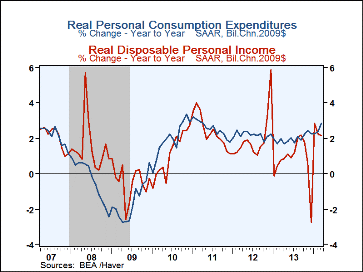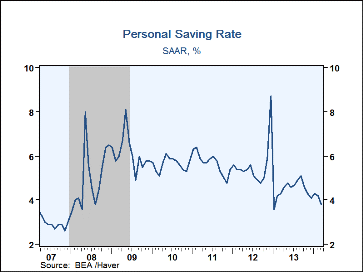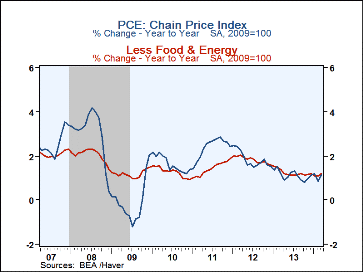 Global| May 01 2014
Global| May 01 2014U.S. Spending Strength Leaves Savings Rate Near Six-Year Low
by:Tom Moeller
|in:Economy in Brief
Summary
Shop 'til you drop. That mentality raised personal consumption expenditures by 0.9% in March (4.0% y/y) following a 0.5% February increase, revised from 0.3%. It was the strongest gain since August 2009. A 0.6% rise had been expected [...]
 Shop 'til you drop. That mentality raised personal consumption expenditures
by 0.9% in March (4.0% y/y) following a 0.5% February increase, revised from
0.3%. It was the strongest gain since August 2009. A 0.6% rise had
been expected in the Action Economics Forecast Survey. A 5.9% jump (6.1%
y/y) in motor vehicle purchases led the gain in spending. That was
followed by a 1.0% rise (2.1% y/y) in recreation services and a 1.0% gain
(4.0% y/y) in housing & utilities. Clothing purchases grew another
0.9% (0.9% y/y) and purchases at restaurants jumped 0.9% (4.0% y/y).
Spending on home furnishings & household equipment increased 0.8%
(2.2% y/y) while gasoline expenditures gained 0.7% (-1.9% y/y). Adjusted for
inflation, PCE gained 0.7% (2.9% y/y) and built on a 0.4% February rise.
Shop 'til you drop. That mentality raised personal consumption expenditures
by 0.9% in March (4.0% y/y) following a 0.5% February increase, revised from
0.3%. It was the strongest gain since August 2009. A 0.6% rise had
been expected in the Action Economics Forecast Survey. A 5.9% jump (6.1%
y/y) in motor vehicle purchases led the gain in spending. That was
followed by a 1.0% rise (2.1% y/y) in recreation services and a 1.0% gain
(4.0% y/y) in housing & utilities. Clothing purchases grew another
0.9% (0.9% y/y) and purchases at restaurants jumped 0.9% (4.0% y/y).
Spending on home furnishings & household equipment increased 0.8%
(2.2% y/y) while gasoline expenditures gained 0.7% (-1.9% y/y). Adjusted for
inflation, PCE gained 0.7% (2.9% y/y) and built on a 0.4% February rise.
The personal savings rate declined to 3.8% from a downwardly revised 4.2%. Except for an aberrant slump late in 2012, the savings rate was its lowest since September 2008. The total amount of personal saving fell 7.9% (-9.3% y/y) and has been trending lower since 2009.
Personal income rose an expected 0.5% (3.3% y/y) during March following a 0.4% February increase, revised from 0.3%. Disposable personal income also increased 0.5% (3.3% y/y). Wages & salaries jumped 0.6% (3.7% y/y), the strongest gain since November. Social Security payments increased 1.0% (4.4% y/y) while rental incomes gained 0.8% (5.2% y/y). Proprietors' income improved 0.7% (0.6% y/y). Also strong was dividend income which posted a 1.0% rise (6.1% y/y), but interest income slipped 0.1% (+3.2% y/y). Government unemployment insurance benefits again were quite weak and fell 2.6% (-43.0% y/y). Adjusted for price inflation, disposable personal income improved 0.3% (2.2% y/y) for the third straight month.
The PCE chain price index increased 0.2% (1.1% y/y) following two months of 0.1% gain. The price index excluding food & energy also rose 0.2% (1.2% y/y) after eight straight months of 0.1% gain. Durable goods prices slipped 0.1% (-2.2% y/y) while nondurable goods prices also eased by 0.1% (+0.1% y/y). Prices for services gained 0.3% (2.1% y/y).
The personal income & consumption figures are available in Haver's USECON and USNA databases. The consensus expectation figure is in the AS1REPNA database.
| Personal Income & Outlays (%) | Mar | Feb | Jan | Y/Y | 2013 | 2012 | 2011 |
|---|---|---|---|---|---|---|---|
| Personal Income | 0.5 | 0.4 | 0.4 | 3.4 | 2.8 | 4.2 | 6.1 |
| Wages & Salaries | 0.6 | 0.3 | 0.4 | 3.7 | 3.1 | 4.3 | 4.1 |
| Disposable Personal Income | 0.5 | 0.4 | 0.4 | 3.3 | 1.9 | 3.9 | 4.8 |
| Personal Consumption Expenditures | 0.9 | 0.5 | 0.2 | 4.0 | 3.1 | 4.1 | 5.0 |
| Personal Saving Rate | 3.8 | 4.2 | 4.3 | 4.3 (Mar '13) |
4.5 | 5.6 | 5.7 |
| PCE Chain Price Index | 0.2 | 0.1 | 0.1 | 1.1 | 1.1 | 1.8 | 2.4 |
| Less Food & Energy | 0.2 | 0.1 | 0.1 | 1.2 | 1.2 | 1.8 | 1.4 |
| Real Disposable Income | 0.3 | 0.3 | 0.3 | 2.2 | 0.7 | 2.0 | 2.4 |
| Real Personal Consumption Expenditures | 0.7 | 0.4 | 0.1 | 2.9 | 2.0 | 2.2 | 2.5 |
Tom Moeller
AuthorMore in Author Profile »Prior to joining Haver Analytics in 2000, Mr. Moeller worked as the Economist at Chancellor Capital Management from 1985 to 1999. There, he developed comprehensive economic forecasts and interpreted economic data for equity and fixed income portfolio managers. Also at Chancellor, Mr. Moeller worked as an equity analyst and was responsible for researching and rating companies in the economically sensitive automobile and housing industries for investment in Chancellor’s equity portfolio. Prior to joining Chancellor, Mr. Moeller was an Economist at Citibank from 1979 to 1984. He also analyzed pricing behavior in the metals industry for the Council on Wage and Price Stability in Washington, D.C. In 1999, Mr. Moeller received the award for most accurate forecast from the Forecasters' Club of New York. From 1990 to 1992 he was President of the New York Association for Business Economists. Mr. Moeller earned an M.B.A. in Finance from Fordham University, where he graduated in 1987. He holds a Bachelor of Arts in Economics from George Washington University.
More Economy in Brief
 Global| Feb 05 2026
Global| Feb 05 2026Charts of the Week: Balanced Policy, Resilient Data and AI Narratives
by:Andrew Cates








